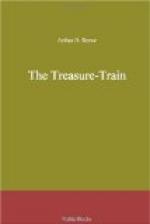This time I saw that he had stopped before some one whom I recognized. It was Captain Marlowe of the American Shipping Trust, to whom Kennedy had been of great assistance at the time of the launching of his great ship, the Usona. Marlowe’s daughter Marjorie was not with him, having not yet returned from her honeymoon trip, and he was accompanied by a man whose face was unfamiliar to me.
As I recognized who it was to whom Kennedy was speaking, I also rose and made my way over to the table. As I approached, the captain turned from Kennedy and greeted me cordially.
“Mr. Whitson,” he introduced the man with him. “Mr. Whitson is sailing to-morrow for St. Thomas on the Arroyo. We’re preparing to extend our steamship lines to the islands as soon as the formalities of the purchase are completed.”
Marlowe turned again to Kennedy and went on with the remark he had evidently been making.
“Of course,” I heard him say, “you know we have Mexico practically blockaded as far as arms and munitions go. Yet, Kennedy, through a secret channel I know that thousands of stands of arms and millions of rounds of ammunition are filtering in there. It’s shameful. I can’t imagine anything more traitorous. Whoever is at the bottom of it ought to swing. It isn’t over the border that they are going. We know that. The troops are there. How is it, then?”
Marlowe looked at us as if he expected Kennedy to catch some one by pure reason. Kennedy said nothing, but it was not because he was not interested.
“Think it over,” pursued Marlowe, who was a patriot above everything else. “Perhaps it will occur to you how you can be of the greatest service to the country. The thing is damnable— damnable.”
Neither Kennedy nor I having anything definite to contribute to the subject, the conversation drifted to the islands and Whitson’s mission. Whitson proved to be very enthusiastic about it. He knew the islands well and had already made a trip there for Marlowe.
A few moments later we shook hands and returned to our own table. It was getting late and the only type that was left to study was the common Broadway midnight-life genus. We paid our check and were about to leave. For an instant we stopped at the coat-room to watch the late arrivals and the departing throng.
“Hello!” greeted a familiar voice beside us. “I’ve been looking all over town for you. They told me you had gone to the theater and I thought I might possibly find you here.”
We turned. It was our old friend Burke, of the Secret Service, accompanied by a stranger.
“I’d like you to meet Mr. Sydney, the new special consular agent whom the government is sending to the Danish West Indies to investigate and report on trade conditions,” he introduced. “We’re off for St. Thomas on the Arroyo, which sails to-morrow noon.”
“Great Scott!” ejaculated Kennedy. “Is everybody daffy over those little islands? What takes you down there, Burke?” Burke looked about hastily, then drew us aside into a recess in the lobby.




